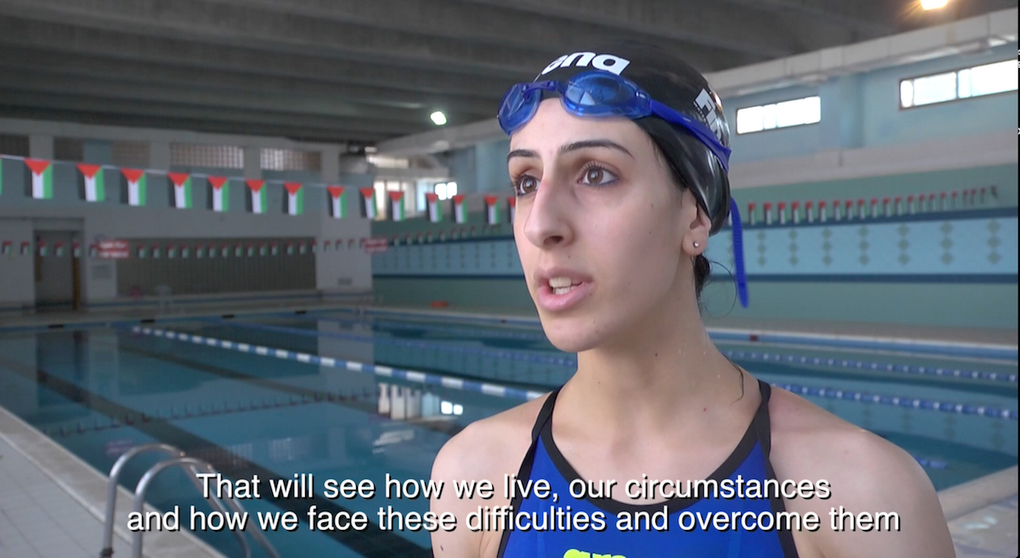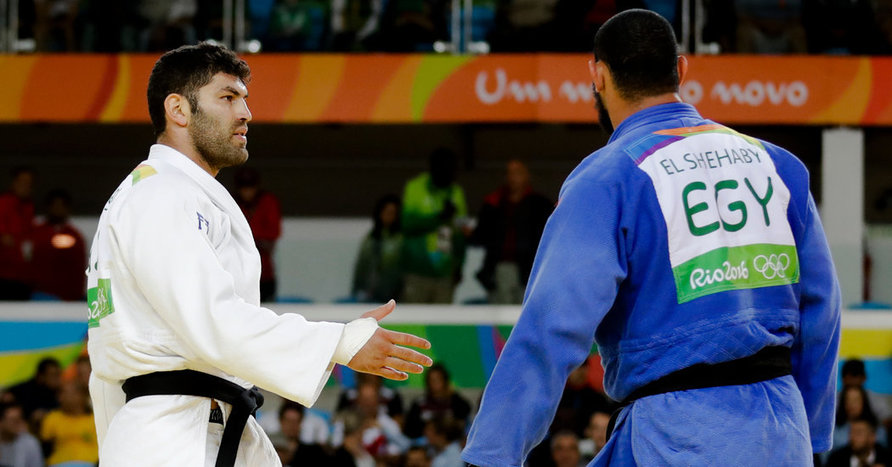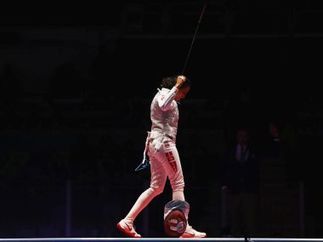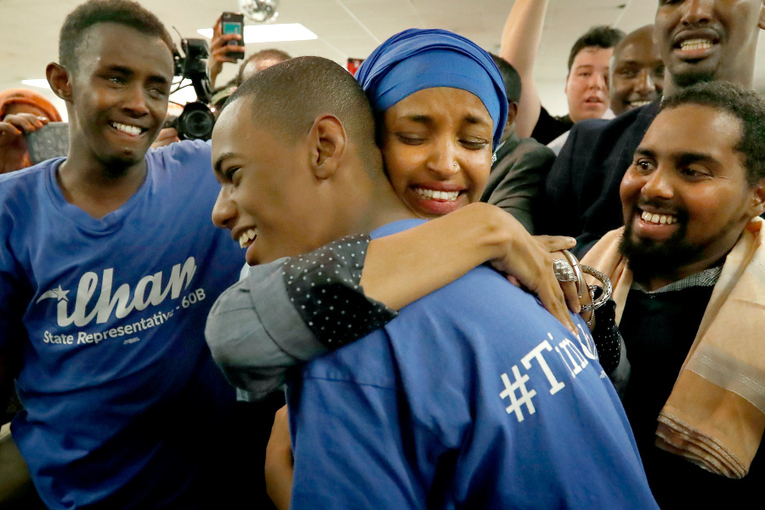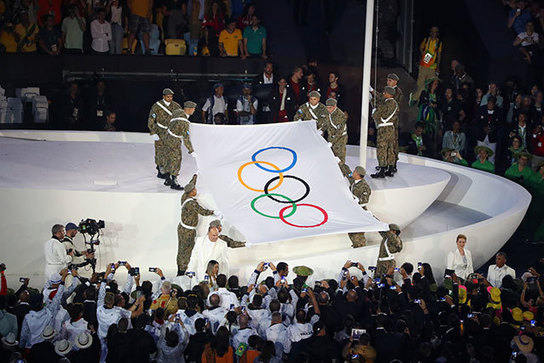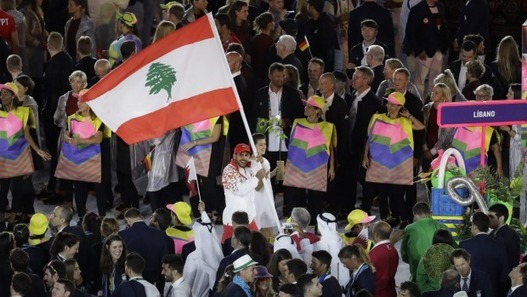
Ruby Hamad
Daily Life
Nacif Elias carries the Lebanese flag during the opening ceremony of the Rio Olympics. Photo: AP
The Lebanese Olympic team caused a minor uproar over the weekend when they refused to let their Israeli counterparts board the same bus as them to the Rio Olympics opening ceremony.
First, one has to wonder at the (lack of) wisdom in arranging for the national teams of two countries that have no diplomatic relations and are officially at war to travel in such cosy quarters. According to the Lebanese delegation, the Israelis had a separate designated bus but insisted on trying to board the bus reserved for the Lebanese anyway.
Nonetheless, the Lebanese team has been accused of going against the spirit of the Games, while the Israelis claim to be “enraged and shocked.” However, given the history of politics and sport, it should be wholly unsurprising that the Lebanese team would choose the Olympics to stage their minor protest.
The argument that politics should be kept out of the Olympics may be nice in theory but it’s baseless in practice. At best it is invoked selectively, with sporting sanctions and boycotts long having been used to pursue political ends.
Most famously, South Africa was formally ejected from the International Olympic Committee in 1970, and banned from virtually all international sports until the end of apartheid in the early 1990s.
In 1976, 30 African countries staged a last minute boycott of the Montreal Games after New Zealand, whose Rugby team had broken the sanction against South Africa, was permitted to compete.
Then, in 1980, the USA led 65 countries in a boycott of the Moscow Summer Olympics to protest the Soviet invasion of Afghanistan. The USSR returned the favour by boycotting the LA Olympics four years later.
I see an awful lot of sports and politics mixing.
Then there is the use of the Olympics themselves as the site of protest. Although their actions are now hailed as heroic, when John Carlos and Tommie Smith raised their fists in the black power salute at the ’68 Games in Mexico, they were widely reviled. Both men were suspended from the US Olympic team and received death threats.
Would anyone today accuse them of going against the spirit of the Olympics by bringing politics into it, or do we agree that sometimes it is appropriate to mention politics in the sporting arena?
But back to Israel and Lebanon. Far from regarding sport as a sacrosanct politics-free zone, Israel itself, as the far greater power in the region, has long used sports to punish its Arab neighbours for political reasons.
Only last week, Israeli officials prevented the Palestinian Olympic Team chief from leaving the Gaza Strip to join his team in Rio. This was after the team itself was forced to repurchase new sports equipment in Brazil after Israel confiscated their supplies at customs.
For those unaware, Israel controls the borders of both Gaza and the Occupied West Bank, meaning nothing and no one is allowed to enter or leave without Israeli permission (you think all the tunnels underneath Gaza are for terrorists? Think again. Those tunnels are how much of Gaza gets its food, clothes, and machinery).
Given this grossly unfair and unbalanced state of affairs, it’s rather unreasonable, if not bordering on the absurd, not to expect a little pushback. But that’s not even the worst of it.
If you want to talk about mixing politics and sport, go no further than that time Israeli soldiers decided to amuse themselves by deliberately shooting Palestinian football players in the feet to prevent them being able to play soccer.
Jawhar Nasser Jawhar, 19, and Adam Abd al-Raouf Halabiya, 17 both members of Palestine’s national soccer team were shot by soldiers while returning home from training on January 31 this year. Neither will ever play soccer again.
In fact, so many members of the Palestinian soccer team have been jailed, killed, or injured by the Israeli Defense Forces (IDF), that Israel was threatened with expulsion from FIFA.
Consider this for a moment. Palestinians have no citizenship and cannot enter or leave Palestinian territory without permission from Israel. They live under military occupation and are subject to collective punishment, sudden eviction, confiscation of their land to make way for Jewish settlements, arrest and detention without charge or trial, and the threat of violence both from settlers and the IDF who are able to act with almost total impunity.
For the lucky few, sports represent a lifeline beyond the separation fence in the West Bank and the siege of Gaza. These soccer players were among that lucky few until their future was destroyed by a deliberate act of physical and emotional violence.
Still angry about the bus incident?
Now, before you accuse me of engaging in a spot of what-aboutery, I’m not telling you all this to deflect attention from the Lebanese team’s actions. I am pointing out that trying to separate politics from sport – or anything else in this region – is impossible.
The Lebanese team would almost certainly have been subject to severe repercussions back home if they had acted against their country’s policy of avoiding all official contact with Israel.
The 2006 Israeli offensive on Lebanon remains a sore point; an assault that again decimated the infrastructure the country had finally rebuilt after its bitter civil war. Israel’s role in this war is not forgotten, nor its invasion of Lebanon in 1982, nor the massacres that took place at the Shatila and Sabra refugee camps, nor the fact that Israel occupied the south of the country until 1999.
The expectation that this be cast aside “in the spirit of the Olympics,” sails well past the island of naivety and anchors firmly in the realm of privilege.
The privilege of those of us safely ensconced in the west, who have not had to live in a climate of eternal war but, nonetheless, demand those that do to stay silent about it so that we can briefly feel good about how the Olympics “brings us together,” despite this not requiring an ounce of risk or sacrifice on our part.
And the privilege of Israel, which, as the superior military power in the region, can effectively act in any manner it likes away from the sporting arena, including inflicting unjust punishment after punishment on Palestinian athletes while the world deliberately averts its eyes, but still assumes the role of the wounded victim when the world decides to cast its selective attention.
Sure, the Olympic Truce claims to promote a peaceful, diplomatic solution to the conflicts that dominate our global relations, but given countries are permitted to compete even when in the midst of catastrophic wars and oppressions, this seems at best symbolic. At worst, it’s a hypocritical propaganda tool that chastises athletes staging a mini-protest but allows the participation of a country that has been conducting a 49-year illegal Occupation with no end in sight.
Add this to the violent evictions in Rio’s poorest favelas, to make way for the gloss and glamour of the increasingly corporate Olympics, and we have to wonder who and what the Games are really for.
The spirit of the Olympics, indeed.
Source: www.dailylife.com.au




